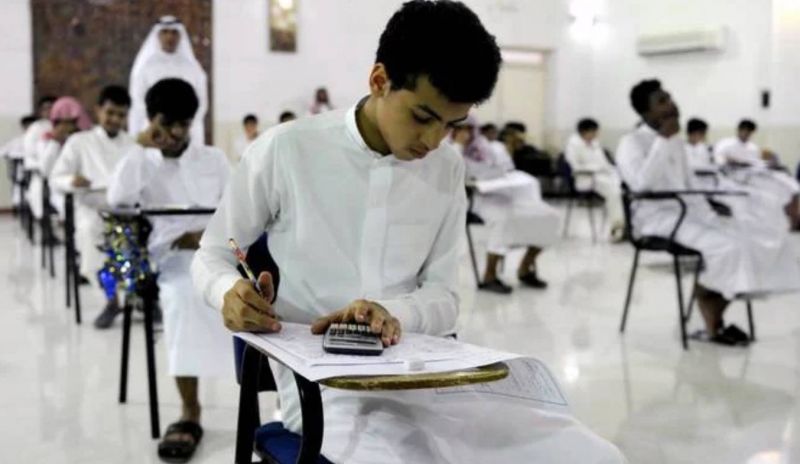
Saudi school children sitting an exam (Credit: AFP archives)
According to a recent report by the Institute for Monitoring Peace and Cultural Tolerance in School Education (Impact-se), references to Christians and Jews were recently amended in Saudi school textbooks, CNN reported on Monday.
Impact-se, an Israeli organization focused on monitoring the representation of Israel and Jews in educational materials, conducted the study.
The report highlights the removal of claims that Jews and Christians are enemies of Islam, and schoolbooks now moderate their language regarding Israel. References to “the Israeli enemy” or “the Zionist enemy” have been replaced with phrases such as “the Israeli occupation” or “the Israeli army of occupation.”
However, the study also notes the presence of other critical references to Israel and the omission of the country from maps. Notably, Saudi Arabia, like most Arab countries, does not mention the Holocaust in its educational curriculum.
Following recommendations from Impact-se, the United Arab Emirates (UAE) Education Ministry is taking steps to update its curricula, specifically to incorporate the teaching of the Holocaust (Shoah) in primary and secondary schools.
In the aftermath of the signing of the 2020 Abraham Accords, which aimed to establish diplomatic relations between Israel and several Arab states, including the UAE, the Emirati embassy in Washington announced on Jan. 5 that schools in the UAE had started teaching the history of the Jewish Holocaust.
This development represents another significant stride in the ongoing process of normalization between the UAE and Israel.
A change that needs to be contextualized
This is not the first instance of Saudi school curricula being altered for political purposes. Saudi Arabia’s school curricula fell under Western scrutiny after the 9/11 attacks, in which 15 of the 19 hijackers were of Saudi origin.
In response to the concerns raised, Saudi Arabia undertook a gradual process of eliminating radical content from its textbooks. Notably, in 2019, an expression likening Jews to “real monkeys” was removed from a second-year textbook, as reported by France Inter.
According to Kristin Diwan, a researcher at the Gulf States Institute in Washington, the recent modifications in Saudi Arabia’s school curricula align with the Kingdom’s evolving political trajectory.
For many years, the Saudi government has sought to establish its legitimacy both domestically and internationally by emphasizing its position as the birthplace of Islam and the custodian of its two holiest sites. However, in recent years, Riyadh has been shifting toward a form of nationalism that distances itself from strict religious adherence.
Diwan acknowledges that while the updated language in the textbooks reflects a greater level of religious tolerance towards Judaism, it remains uncertain whether this translates to political acceptance of Israel.
An announcement to be treated with caution
Aziz Alghashian, a researcher focusing on Saudi foreign policy and the Kingdom’s connections with Israel, highlights that Saudi Arabia is currently experiencing a transformation in its relationship with Islam.
Alghashian argues that the adjustments made to Saudi school textbooks, while significant, should not be viewed as a substantial shift toward full acceptance of Israel. He believes that certain individuals in Israel are eager for normalization with Saudi Arabia, as long as any action related to Israel is portrayed in a positive light within that context.
Alghashian told CNN that Some people in Israel want normalization with Saudi Arabia so much that any action regarding Israel will be presented as something positive in that sense.
In the United States, President Joe Biden has placed great emphasis on promoting the normalization of relations between Israel and Saudi Arabia as a key priority during his term in office.
Under the leadership of Crown Prince Mohammed bin Salman (MBS), Saudi Arabia has displayed indications of becoming more open, including the unprecedented move of opening its airspace to Israeli airlines last year.
However, the Saudi government has maintained its stance that normalization will only occur once a Palestinian state is established, aligning with the Arab Peace Initiative launched by King Abdullah in Beirut in 2002. This initiative calls for a comprehensive resolution of the Israeli-Palestinian conflict, including the establishment of an independent Palestinian state based on pre-1967 borders and with East Jerusalem as its capital.
Elie Podeh, a professor in the Department of Islamic and Middle Eastern Studies at the Hebrew University of Jerusalem, and an expert on education systems in the region told CNN that the recent changes in Saudi Arabia’s school curricula are part of a gradual and ongoing process of moderation.
Podeh highlighted that even though an entire chapter on the Palestinian cause has been removed, it does not imply that the Saudi government has suddenly abandoned its concern for the issue. According to Podeh, it is evident that the Saudi government continues to support the Palestinian cause, as they are not denying its importance.
However, experts agree that mere alterations to school textbooks will not suffice in molding public perception.
According to Podeh, in today’s world, social networks and various means of socialization tend to diminish the significance of textbooks to some degree.
Diwan further asserted that the opinions of individuals are shaped by media messages, global occurrences, and personal encounters. None of these factors are under the state’s control.
This article was originally published in French in L'Orient-Le Jour. Translation by Sahar Ghoussoub.
CORRECTION: An earlier version of this article's headline incorrectly stated that Saudi Arabia removed nearly all negative references to Israel in its school textbooks. The headline has been updated for accuracy.